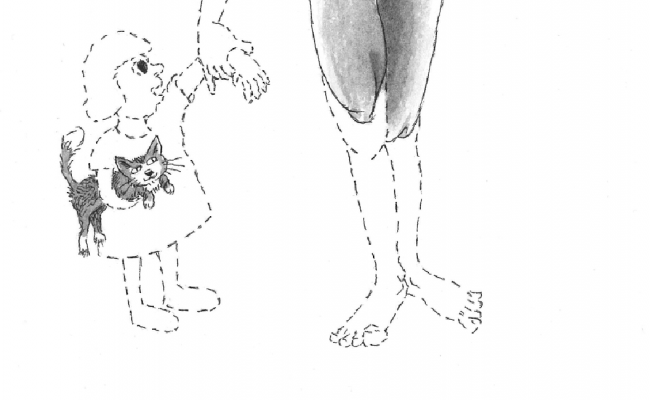1.
The moon forms weird shapes in the ripple of the pub window. The dark-haired woman leans her head against the glass, tapping her fingertips against the windowsill in anxious patterns. There is a story lingering in the back of her head. She cannot remember if it is a story someone told her a very long time ago, or a story that she dreamt of once. When she tries to fix upon the details they slip away, like lights in fog.
2.
Hêphaistos the glorious cripple god is a son of only mothers, they say, born of Hera, and cast away by Hera too, and caught and held by Thetis and Eurynomê. Thetis was a sea-witch, a childhood friend of death. Eurynomê was a daughter of the ocean, or perhaps a surname of Artemis, but in any case she was closely identified in some ancient traditions with the moon, and so she hung shining in the cave where they lived, while Thetis bent around her in an endless stream. The moon was smaller in those days, perhaps the size of a silver coin. The force she exerted on Thetis’s body was not strong, only a gentle, rolling tug back and forth, enough to send her companion laughing and lapping up the walls of the cave, but not enough to truly dislodge her. Together they filled the boy with love, until all he knew was love, and later he would marry the goddess of love herself, so well did he know her. As his mothers filled his heart with love, they also filled his eyes with beauty, and he knew himself to be beautiful, and learnt how to shape beauty out of the world around him. Although his misshapen leg was the reason for his exile, Hêphaistos never found reason to hate it, since after all Eurynomê had a tail like a fish and she was bright and perfect, and Thetis could take any shape she pleased and be beautiful in all of them.
Later still, Hêphaistos would stand beside his foster-brother Akhilleus, who also had a bad leg, and the love would burn so brightly in his chest that it almost hurt. He would think of Thetis, swirling all around the circle of the cave, and of shining Eurynomê. In his strong hands the thought would take shape, molten and bright, his whole world pouring into that gleaming disc: the moon in the centre, then all the other constellations, the sky and the earth, kings and cattle, brides and lions, and all around them the dancing mercurial pulse of the great river, all woven into the strongest shield a mortal ever held.
3.
The moon forms weird shapes in the ripple of the pub window. The silvery form shivers for a moment and then melts away, blotted out by clouds passing overhead. The dark-haired woman blows on her hands for warmth, then tucks them under her thighs for a moment, letting them rest between the fabric of her skirt and the curving surface of her wheelchair cushion. The cold will be worse the longer she stays outside. After a time the chill will seep into the aluminium frame of her wheelchair, and she will feel as if she will never be warm again.
She had poked her head around the door to ask if there was an accessible entrance, and they said, we’re so sorry, but there are steps at every entry point, it’s an old building, you see, it was built before disabled people existed. We’re sorry, but we can carry you up the stairs if you like, at great risk to your safety and our own. We’re sorry, but if you call ahead next time maybe there’ll be a goods and services entrance that you can get in through, or a lift that we usually keep locked, or a hydraulic wheelchair lift that will break halfway up. We’re sorry, but we have no plans to renovate. We’re sorry, but there’s nothing we can do. There’s another pub nearby that might be accessible, but we’re not sure, because all of the pubs are in old buildings, and they were built before disabled people existed.
4.
This story travelled west from the land between the rivers. The mad god Dionysos is called twice-born, because his mother Semele was struck by lightning while pregnant, leaving his father Zeus to finish the pregnancy. Dionysos was raised as a girl to hide him from Hera’s jealous gaze, but Hera found him nonetheless, and struck him with lunacy, or the touch of the moon. The moon exerts her pull on water, and since the body is comprised mainly of water, she inspires madness when she is full.
Thus possessed, Dionysos wandered through many lands and waters, and his power and madness deepened as he travelled further into the wine-dark sea. As he travelled he gathered around him a following of madwomen called maenads, and nymphs, and centaurs, and lusty satyrs, who would dance and drink and sing to the crashing of cymbals and the beating of drums. Their revelry was wild and grand, and as it went on their frenzy would increase until they were in a state of enthousiasmos, being filled with the god, or ekstasis, stepping outside one’s self. At the peak of their ecstatic delirium the maenads would catch wild animals and tear them apart with their bare hands.
The maenads were cruel and terrible in their madness, and no weapon of iron could wound them. The madness of poets is a different kind, deriving also from the gods, and it is no less cruel.
5.
In La Terra Australe, the southern land, the people are of dual sex and live in perfect geometric harmony, without violent passions, and their lands are visited by none save monsters who arrive in ships.
In L’Isle des Hermaphrodites the people are of dual sex and their bodies shake and tremble like leaves in the wind, and they dedicate themselves to worship of Bacchus and Venus, to creating art, and to the pursuit of every sin imaginable.
In Viraginia, not far from the neighbouring Hermaphroditica Island, the men are dominated in the bedroom and in the courts of law.
In Dreamland the men are very pretty and pale, and their upbringing nurtures muscular inferiority and mental imbecility, after which they are confined to the drudgery of the kitchen. They wear flimsy lace and embroidery, and ribbons and ruffles, and are wrapped in corsets. These restrictive fashions induce certain diseases and weaknesses, so many of them are paralysed, and their lungs are rendered useless by compression.
In Erewhon criminals are treated as if they are ill and ill people are punished as if they are criminals, and there are no machines anywhere.
In Nowhere there are a great many machines, but there are no cities, no prisons, no courts, no authorities, no private property, no class stratification, no divorce, and no contractual marriage. The women are free to do whatever they like, and what they like to do is domestic labour.
In New Amazonia men are disallowed from political office because they are too prone to bigotry, and the women, who are wholly free of bigotry, are vegetarians who euthanise all disabled children.
In Mizora the men have been eliminated and the women reproduce by parthenogenesis. They are all sweet-voiced blue-eyed blondes, and they hold a great hatred for people of darker complexions. By attending to the quality of blood they have erased all hereditary disease, all illness, all poverty and crime, and their children are never born deformed or weak, either physically or mentally.
In the Crystal Age there is only one language, and the people live in pastoral harmony. They do not fuck or fall in love, and their life spans extend for centuries. They possess a curative potion for time, disease, and madness, which naturally causes the body to die, since death is the only release from the pains of life.
6.
Before there was a land between the rivers there were no days and nights. Before there was a land between the rivers there was no heaven or earth. Before there was a land between the rivers, before there was heaven and earth, there was no sunlight or moonlight, and all was dark, and there was only water, and the water knew herself as Nammu, and she was made of darkness and chaos.
Then the dark water and the chaotic water came together. Then the saltwater and the freshwater came together. Then the waters came together and beget the gods, and the gods bore names, and one of these was Enki.
In those days and nights Enki the god of wisdom lay sleeping in primordial seas. Enki the god of wisdom and creation lay sleeping in primordial waters, in the womb of the earth. From his mother’s womb his mother woke him. From her womb Nammu the queen of cosmic oceans woke him, and said, My son, the gods are tired of digging up canals and piling up the silt. My son, the gods are tired of dredging the clay. My son, the gods are tired of being taken in marriage, and of taking each other in marriage. My son, all of my children are gods, and they are unhappy. My son, I have given you wisdom so that you may have children, and your children will not be gods.
At the word of his mother Enki arose from his sleep, and then he fell into a waking dream, and he dreamed of the children he would have, and he dreamed that his children would not be gods. Enki knew the gods were whole and huge and terrible. Enki knew the gods had many limbs and eyes and the organs of every sex. Enki knew that his children would not live among the deathless.
Enki turned to his mother Nammu, and said, My mother, you have given me wisdom so that I may dream of children, and my children will not be gods. My mother, if you will give me clay, my consort Ninḫursaĝ will shape the clay into forms, and I will give purpose to the forms that Ninḫursaĝ makes out of clay.
And so Nammu the great mother goddess brought forth clay, and Ninḫursaĝ shaped the clay, and Enki gave purpose to the clay. And all the gods rejoiced and drank.
And Ninḫursaĝ and Enki rejoiced and drank. And Ninḫursaĝ and Enki rejoiced and became drunk. And Ninḫursaĝ said to Enki, My consort, the bodies of our children can be good or bad, and the shapes I give to them define their purpose.
And Enki answered Ninḫursaĝ, My consort, the bodies of our children are neither good nor bad, and I shall give purposes to all of them.
Ninḫursaĝ fashioned from the clay a child whose hands were weak and did not bend. Enki looked at the child whose hands were weak and did not bend. Enki gave the child a purpose without manual labour, in service to the king.
Second, Ninḫursaĝ fashioned from the clay a child who turned back the light, a child whose eyes were always open. Enki looked at the child who turned back the light, the child whose eyes were always open. Enki gave the child a purpose in the musical arts.
Third, Ninḫursaĝ fashioned from the clay a child with frozen feet, a child with paralysed feet. Enki looked at the child with frozen feet, the child with paralysed feet. Enki gave the child a purpose as a silversmith.
Fourth, Ninḫursaĝ fashioned from the clay a child who did not speak. Enki looked at the child who did not speak. Enki gave the child a purpose in service to the king, as respite from the chatter of the people.
Fifth, Ninḫursaĝ fashioned from the clay a child who could not give birth. Enki looked at the child who could not give birth. Enki gave the child a purpose as a courtesan in the household of the queen.
Sixth, Ninḫursaĝ fashioned from the clay a child without sex organs. Enki looked at the child without sex organs. Enki gave the child a purpose overseeing the women’s quarters of the palace.
Last of all, Enki took the clay and fashioned a child who was sick, a child whose eyes were sick, a child whose throat was sick. The child could hardly breathe. The child’s ribs trembled. The child’s lungs were sick, the child’s heart was sick, the child’s bowels were sick. The child could not eat bread with the lolling hands that Enki had fashioned. The child’s spine and head were dislocated. The child’s weak hips and shaky feet could not support the body that Enki had fashioned.
Enki said to Ninḫursaĝ, My consort, will you give a purpose to this child that I have fashioned?
Ninḫursaĝ turned to the child. She asked questions but the child could not speak. She offered bread but the child could not reach out. The child could not stand up, the child could not sit down, the child could not lie down. Ninḫursaĝ answered Enki, My consort, the child you have fashioned is neither alive nor dead. The child you have fashioned must be supported by others. I cannot give this child a purpose.
Enki answered Ninḫursaĝ, I gave a purpose to the child whose hands were weak and did not bend, I gave a purpose to the child who turned back the light, I gave a purpose to the child with frozen feet, I gave a purpose to the child who did not speak, I gave a purpose to the child who could not give birth, I gave a purpose to the child without sex organs. If you cannot give a purpose to the child that I have fashioned, then the child’s purpose will remain for the child to decide.
7.
While wandering through a green wood near the sacred cave of Hermes, the blind prophet Teiresias strikes ahead of him with his seeking-staff, and two copulating serpents fall beneath his stick. Snakes are sacred to the Great Mother, and so Hera transforms Teiresias into a woman for seven years.
Seven years before this, the prophet Teiresias is consulted in an argument between Zeus and Hera. Lush with wine, the lord of thunder insists that women have the better part of sex, while the queen of heaven argues that it is men who feel the greater pleasure. They turn to mortal Teiresias, who sees into the future, and has knowledge of either sex. Teiresias closes his eyes to think, and then says that his opinion sides with Zeus. Enraged, Hera blinds the prophet with light, and his dark eyes turn silver like the moon. Taking pity, Zeus bestows upon Teiresias greater foresight and a life span of seven lives.
When Teiresias becomes a woman, the people no longer believe her prophecies, and think her mad. She takes the name Kassandra, from andrós, man, and kekasmai, shining. Her eyes are pale and bright like the moon, and her hair is dark like the wine-deep seas.
The future unfolds before her. Here dies Patroklos garbed in the broken armour of Akhilleus, and here dies Akhilleus garbed in the shining armour of Hêphaistos. Troy falls in flames, and an ocean away the new city of Rome is founded. Odysseus wanders for a decade. Kassandra dies and is consulted in the underworld, where Odysseus begs her for knowledge of his journey home. She tells him of his voyages yet to come, and of his own death, which steals upon him very gently, and far from the sea.
She lives again for seven lives in total. In each life she understands the language of birds, and she divines the future from the shape of fire and smoke, and she speaks to the dead and the living. She inhales cave-vapours, carries messages from the gods. She garbs herself in shining armour, goes to war, is burnt for cross-dressing heresy. She dies and rises. She sees worlds full of glittering machines, worlds in pastoral harmony, worlds of blood and sin and politics. She sees worlds fit to live in, worlds full of flawed creatures, and room for all of them.
She sees the moon forming weird shapes in the ripple of the pub window. She leans her head against the glass, tapping her fingertips. The moon wavers, brightens.
Notes: ‘The Moon Under Water’ is the title of an essay by George Orwell, imagining his ideal pub. The texts mentioned in section 5 are all pieces of utopian fiction, by Gabriel de Foigny, Artus Thomas, Joseph Hall, Annie Denton Cridge, Samuel Butler, William Morris, Elizabeth Burgoyne Corbett, Mary E Bradley, and WH Hudson. Section 7 paraphrases a quotation from Harriet McBryde-Johnson: ‘But ultimately we’ll make a world that’s fit to live in, a society that has room for all its flawed creatures.’
Read the rest of Overland 233
If you enjoyed this piece, buy the issue




